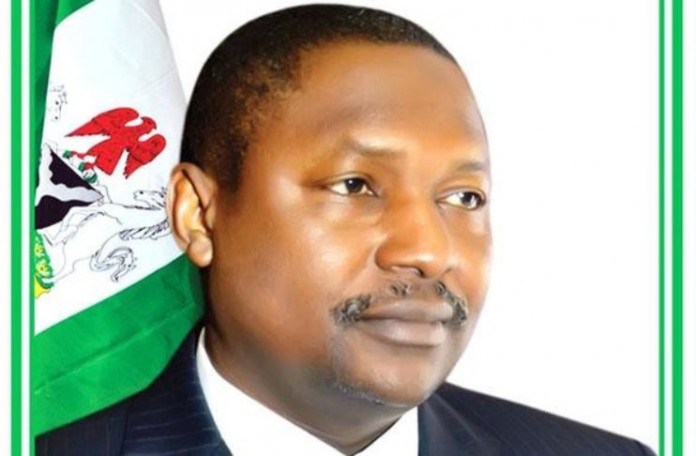Anti-Corruption: ‘How Proposed Bill Whittles Down Powers Of EFCC Chairman’
– Creates Director-General, Other Changes
The powers of the Chairman of the Economic and Financial Crimes Commission are about to be whittled down, going by the provisions of a new bill seeking to repeal the EFCC Act, 2004.
Advertisement
THE WHISTLER gathered on Sunday that the National Assembly, still on its annual access, was expected to attend to the bill on resumption on September 16, after the Executive Arm of Government would have laid it for legislative dissection.
A key provision of the new bill is the establishment of the Office of the Director-General of the anti-graft agency, different from that of the chairman, according to Sunday Punch.
While the chairman will still be part of the new EFCC, his job shall be to head the board of the commission, leaving the DG to carry out the real duties of investigating and prosecuting economic and financial crimes.
The DG, who must be an officer not below the rank of a Director in the public service, may still be in service or retired as of the time of the appointment.
Advertisement
The holder of the office may also come from an equivalent position or years of experience in the private sector.
The long title of the bill, said to have received finishing touches at the Office of the Attorney-General of the Federation and Minister of Justice, reads , “An Act to Repeal the Economic and Financial Crimes Commission (Establishment) Act, 2004 (act no. 1 of 2004) and Enact the Economic and Financial Crimes Commission Act Which Establishes a More Effective and Efficient Economic and Financial Crimes Commission to Conduct Enquiries and Investigate All Economic and Financial Crimes and Related Offences and for other Related Matters.”
The procedure of appointing the DG is that the AGF shall recommend the officer for Mr President’s approval and subsequent confirmation of the nominee by the National Assembly, specifically, the Senate.
The appointee takes over all the roles currently played by the EFCC’s chairman, while the chairman heads the board of the commission.
However, government insiders claim that the idea is to strengthen the anti-corruption war of the Federal Government as against weakening it.
Advertisement
Some portions of the bill, specifically Section 8, note, “There shall be for the commission, a Director-General who shall be appointed by the President on the recommendation of the Attorney-General subject to the confirmation by the Senate.
“Subject to the provisions of subsection (3) of this section, the Director-General shall be a retired or serving member of any government institution, including any security or law enforcement agency not below the rank of a director or its equivalent or a person from the private sector.
“A person shall not be appointed as a director-general unless he is of proven integrity and has 15 years cognate experience in security, forensic or financial crimes investigation; forensic accounting or auditing; or law practice or enforcement relating to economic and financial crimes or anti-corruption.”
The bill provides for a four-year tenure, which can be renewed for a second and final term.
On the board, besides the chairman and the DG, the AGF shall also recommend the following for the President’s nod: An officer representing the Federal Ministry of Justice; an official of the Central Bank of Nigeria; the Director of Nigerian Financial Intelligence Unit; two other Nigerians with 15 years’ knowledge in legal/finance/banking/forensic auditing; and the Director of Administration to the commission.
The bill emphasises the constitutional powers of the AGF, specifically Section 174 of the 1999 Constitution, to intervene in any ongoing case by taking control of it from the EFCC.
Advertisement
The AGF can simply call for the files and give further directives as to what shall become the fate of such a proceeding.
“On receipt of the notice under subsection (2) of this section, the commission shall hand over to the Attorney-General the prosecution file and all documents relating to the prosecution and provide him with such other information as he may require on the matter within the time specified by him”, the bill spells out.
THE WHISTLER observes that there is a link between this new bill and the September 25 clarification by the AGF’s office that the minister was already sufficiently empowered by the constitution to alter the pattern of operations of any government agency directly under his supervision.
The clarification came after some public commentators suggested that the AGF’s office sought to annex the powers of the EFCC chairman in the light of the corruption allegations and investigation of the suspended former acting chairman, Mr Ibrahim Magu.
Recall that Magu was generally perceived to be too ‘powerful’ and could not be controlled by the supervisory ministry.
The AGF, Abubakar Malami, SAN, in the said clarification by his Special Assistant on Media and Public Relations, Dr Umar Jibrilu Gwandu, stated, “The Attorney-General of the Federation and Minister of Justice does not need the tinkering of the current Economic and Financial Crime (Establishment) Act 2004 to enable him regulate the Institution and could therefore not, in any ways, seek to sponsor any bill for more powers to control the commission.”
He added, “At the moment, the priority of the Office of the Attorney-General of the Federation and Minister of Justice is to see to the effective execution of its statutory mandates of supervising all the parastatals under the Federal Ministry of Justice in a way that makes them function in the best interest of the general public, which constitutional responsibility he is engaged by President Muhammadu Buhari to discharge.”



